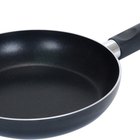LanaSweet/iStock/GettyImages
Back in the day, lard and butter were essential ingredients in many dishes, adding richness and flavor — along with high levels of unhealthy fat. As health became more of a concern, it brought a new appreciation for the use of olive oil in cooking, prized by cooks for its versatility and healthfulness. Today, many recipes call for it, but there are other oils that can be substituted for olive oil when cooking.
Canola Oil
The most common substitute for olive oil is canola oil. Made from the rapeseed plant, canola oil is excellent for all-purpose use in baking and cooking, and even has many of the same beneficial health properties as olive oil. In fact, canola oil actually has less saturated fat than olive oil, and contains the lowest level of saturated fat of all commonly used cooking oils. Because of its neutral taste, canola oil can be easily substituted for olive oil in frying, and is better suited to baking than olive oil.
Peanut Oil
Peanut oil can also sub for olive oil, as it’s an all-purpose oil that, like olive oil, is high in heart-healthy monounsaturated fats. Peanut oil performs better for frying food than olive oil because of its high smoke point, which means food can be fried at higher temperatures before the oil in the pan begins to smoke. The shelf life of peanut oil is also longer than other oils, but peanut oil should not be used if the food being prepared will be eaten by anyone with a peanut allergy.
Sesame Oil
Sesame oil is typically used in preparing Asian cuisine, although it can be used for general cooking as a substitute for olive oil. Sesame oil is higher in polyunsaturated fat than olive oil, which should be taken into consideration when preparing a low-fat dish. Sesame oil also has a strong taste, so it is best used sparingly, as a little sesame oil can go a long way toward flavoring a meal. Dark sesame oil works best for seasoning, in items such as hummus or in a marinade, while light sesame oil is better for frying.
Other Substitutes
There are some other less-common oils that can be substituted for olive oil in cooking, such as avocado oil, a light-tasting oil that can withstand cooking with high heat. Both grapeseed oil and sunflower oil also can be substituted, as both oils are mild-flavored and have high smoke points. In addition, artisanal oils made from macadamia nuts, hazelnuts, pumpkin seeds, almonds and hemp may also work to replace olive oil, although each of these offers its own specific flavor that may not work with a particular recipe.
Related Articles

Substitutes for Groundnut Oil in Cooking

Mineral Oil Vs. Olive Oil

What is Rapeseed Oil?

What Are Good Substitutes for Vegetable ...

Can You Substitute Shortening for ...
Cooking With Camellia Oil

Substitutes for Walnut Oil
How Long Can You Keep and Reuse Peanut ...

How to Roast Whole Flounder

The Benefits of Tuna & Omega-3 Oil

How to Use Oil in a Nonstick Pan

Can You Grease a Pan With Canola Oil?

What Is Expeller Pressed Canola Oil?

Can I Substitute Olive Oil for ...

Substitutes for a Tuna Steak

Which Olive Oil Is Best to Fry With?

What Kind of Oil Should I Use to ...

Substitution for Oil in Baking Brownies

Canola Oil Vs. Lard in Baking

Does Canola Oil Taste the Same as ...